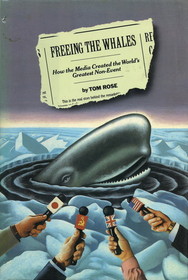If you are over 30, you may remember the three whales who were "frozen in" near Barrow, Alaska in the mid-80s; they had frolicked too long, and were frozen out of their annual passage south. Several governments and agencies contributed to trying to free these struggling and progressively wearying creatures, including Russia's sending a huge freighter to try to break an ice passage. In the end, the youngest whale did drown, but the othe two were saved. Tom Rose, a WSJ reporter then, joined the huge contingent of reporters who flew to this northernmost part of Alaska, where living - and visiting - is rough, primitive, and extreme. Mr. Rose's rather scoffing title - calling the whales' misfortune a "non-event" (we all know the answer to that one: not to these whales) because, after all, several of these mammals do drown every year in the same conditions, with no attention whatsoever -does not reflect how he approaches his experience and his reporting. Everything about the "event:" the Eskimos and the residents of Barrow, the oil workers, the sled-dogs and their keepers, the reporters, the individuals directly involved in the rescue efforts (including a resulting marriage), as well as the author's observations and philosophy and his analysis of how this got to be "the world's greatest," is treated conscientiously, seriously, and descriptively (for example, though I first read the book twenty years ago, I still remember the startling skill, practice, and composure required to relieve oneself safely in the outdoor privies).
Search -
Freeing the Whales: How the Media Created the World's Greatest Non-Event
Freeing the Whales How the Media Created the World's Greatest NonEvent
Author:
This is the real story behind the remarkable, bizarre and often times uproarious event that for a fortnight mesmerized an anxious world. On Oct. 7, 1988, an Eskimo hunter found three California Gray whales imprisoned in the Arctic ice. In the past as was nature's way, trapped whales always died. But this time incredible thi... more »
Author:
This is the real story behind the remarkable, bizarre and often times uproarious event that for a fortnight mesmerized an anxious world. On Oct. 7, 1988, an Eskimo hunter found three California Gray whales imprisoned in the Arctic ice. In the past as was nature's way, trapped whales always died. But this time incredible thi... more »
ISBN-13: 9781559720113
ISBN-10: 1559720115
Publication Date: 12/1989
Pages: 318
Rating: 2
ISBN-10: 1559720115
Publication Date: 12/1989
Pages: 318
Rating: 2
2.8 stars, based on 2 ratings
Publisher: Carol Publishing Corporation
Book Type: Hardcover
Members Wishing: 0
Reviews: Member | Amazon | Write a Review
Book Type: Hardcover
Members Wishing: 0
Reviews: Member | Amazon | Write a Review
Please Log in to Rate these Book Reviews
Genres:
- Crafts, Hobbies & Home >> Pets & Animal Care >> General
- Nonfiction >> Social Sciences
- Nonfiction >> Social Sciences >> Sociology
- Nonfiction >> Social Sciences >> Communication & Media Studies




